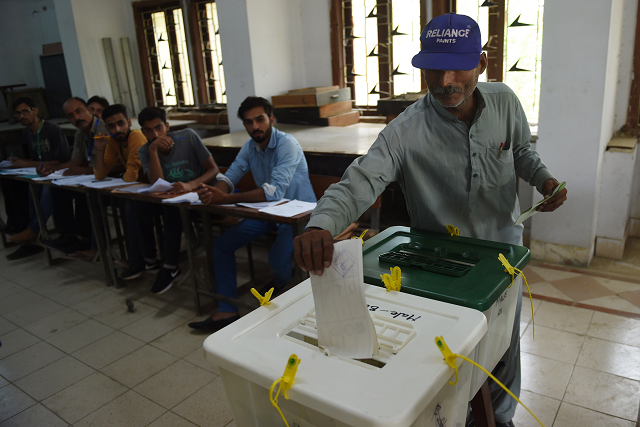
Firstly, human beings have developed measurement tools to gauge the correctness of things, including elections. That does not mean everyone possesses the skills to use these tools. There are three prerequisites in the context: professional skill; quality of measurement tools; and ability to read and analyse data. Let’s examine the GE 2018 by using scientific tools and methods. But, first we must recall a short history of elections in Pakistan. The 1970 general election is still remembered as credible, but had caused a huge bloodbath and finally broke the country. Except for the 1977, all other elections, though manipulated, ended in a peaceful transfer of power, but all the resulting governments failed to complete their tenures. What category will GE 2018 fall in? Let’s consider the following first.
Secondly, one year later, the opposition parties have decided to observe 25th July as Black Day. Why? They have the right to protest, but are they justified in doing so? If yes, did they present any proof of rigging and if yes, where is that proof? Mere allegations are not enough. Twelve months are enough to collect evidences; analyse them; and expose any wrongdoings in the polling, result preparation and consolidation, and its announcement. It is a fact that candidates and parties spend huge amounts of wealth on elections. Then why do these political parties shy away from investing monies on investigating electoral fraud and rigging? The PPP had conducted such an exercise in the aftermath of the GE 1990. They must do it again.
Thirdly, the Elections Act 2017 was passed unanimously by all parties, including the ones protesting now. Section 140 of the Act provides legal remedy for seeking justice through election petitions. According to the ECP website, in GE 2013, as many as 410 petitions were filed. Contrary to massive threats of protests against the alleged rigging, the opposition parties did not take full advantage of Clause 140. The combined opposition parties filed nearly 150 fewer petitions after GE 2018. Politicians tend to politicise such issues. This is their right but not an ethical practice.
Fourthly, some of the opposition parties, particularly from Balochistan and Khyber-Pakhtunkhwa (K-P) attributed their defeat to an organised rigging. They said the results were changed against them, their polling agents were forcefully kicked out and their ballots were spoiled and then rejected. But scanning of the election results reveals that in many constituencies (four NA and 13 PA constituencies of Balochistan and 18 of K-P) the MMA, PKMAP, ANP, PPPP and the PML-N mutually defeated each other. Now let’s dissect the phenomenon of the rejected ballots being higher than the margin of victory. Here are the facts. In Punjab, the PML-N and the PPPP together won 28 such constituencies, while the PTI won 23. In Sindh, the PPPP and the PTI grabbed nine and four seats respectively. In K-P, the MMA, PML-N, PPPP and the ANP together won 12 such seats and the PTI 11. Balochistan too witnessed this phenomenon, where the PTI and the MMA got three each.
I remember that soon after GE 2013, Fafen had tried to divert the attention of stakeholders towards this phenomenon. Hardly anybody took it seriously. It had happened in only 35 constituencies then. By GE 2018, it occurred in 170 constituencies. The above data shows that all parties, including those in the opposition, benefitted from this phenomenon. If this was a result of an organised corrupt practice, then no one is innocent.
Fifthly, it is being alleged that polling agents belonging to opposition parties were evicted from polling stations before counting. This happens in every election. Consider that the ECP established 85,090 polling stations and 244,687 polling booths. This means on average there were nearly three polling booths per polling station. It is worth stating that stamped ballot papers of all ballot boxes of each polling booth are mixed and then counted in one room. Therefore, each candidate can keep only one polling agent during the counting. Extra polling agents have to leave. Just imagine if there are 15 candidates and every polling agent of each polling booth is allowed to watch the counting, there will be a crowd of 45-50 people — highly risky scenario. If one polling agent can represent and watch the whole polling process in a polling booth, why can’t one do the same during counting?
Furthermore, in relation to the above, it has also been rumoured that in GE 2018, the number of overall rejected ballots (RBs) jumped manifold. This is a half-truth which has always been lethal because it is very often perceived as the full truth. Here are some facts. Since GE 2002, the number of RBs has been growing with supersonic speed. In 2002, there were just 775,720 RBs. By GE 2013, we saw a 100% growth (1,502,717) while between 2013 and 2018, they increased only by 10% (161,282). So the largest jump took place in 2013.
Some of the above-mentioned ills and attitudes could be addressed and improved should the ECP improve its data gathering, analysis and timely dissemination of facts. This will, I believe, deter adventurous and corrupt politicians from spinning facts. Parliament must also play its role by improving legislation and by making the ECP independent of political (partisan) influence. The peaceful, orderly, free and fair conduct of elections in the newly-merged districts on July 20th must have enhanced trust and confidence of stakeholders and the general public in the ECP and state institutions. Concrete steps must also be taken to further improve and sustain the incipient achievements.
Moreover, there is an urgent need to start a well thought out process to making our Parliament, provincial assemblies and local councils more democratic. We must get rid of the indirect mode to fill quota seats. Consider this: more than 38% of our Parliament consists of unelected members (21% and 100% members of the National Assembly and Senate respectively). In the provinces, this ratio is one-fifth. The situation of local councils is even worse. This undemocratic modus operandi is the trumps the above-mentioned ills as politicians use its presence to woo influential and corrupt elements. They invest in leaders’ election campaigns. In case of failure, they are likely to lose the promised quota and Senate seats. As a result, leaders may lose their finances and votes. Therefore, in order to keep them under their fold, leaders are highly likely to blame external factors and mobilise supporters in protest. We can weaken this dangerous mind-set by providing an independent opinion.
Published in The Express Tribune, July 26th, 2019.
Like Opinion & Editorial on Facebook, follow @ETOpEd on Twitter to receive all updates on all our daily pieces.














COMMENTS
Comments are moderated and generally will be posted if they are on-topic and not abusive.
For more information, please see our Comments FAQ